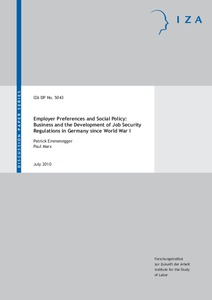Employer preferences and social policy: business and the development of job security regulations in Germany since World War I
"This article examines the role of business in the historical development of job security regulations in Germany from their creation in the inter-war period to the dawn of the crisis of the 'German Model' in the 1980s. It contrasts the varieties of capitalism approach, which sees busi...
| Main Authors: | , |
|---|---|
| Institution: | ETUI-European Trade Union Institute |
| Format: | TEXT |
| Language: | English |
| Published: |
Bonn
2010
IZA |
| Subjects: | |
| Online Access: | https://www.labourline.org/KENTIKA-19184005124919022879-employer-preferences-and-socia.htm |
| Summary: | "This article examines the role of business in the historical development of job security regulations in Germany from their creation in the inter-war period to the dawn of the crisis of the 'German Model' in the 1980s. It contrasts the varieties of capitalism approach, which sees business as protagonists, or at least consenters, in the development of job security regulations with a conflict-oriented approach, which sees the labour movement as protagonists and business as antagonists in the development of job security regulations. The empirical analysis is based on primary and secondary sources and shows that at no point in time German employers preferred strict over flexible job security regulations. Quite the contrary, high levels of job security regulations have been forced upon employers by radicalized labour movements in periods of business weakness in the aftermath of both World Wars. " |
|---|---|
| Physical Description: | 20 p. Digital |

